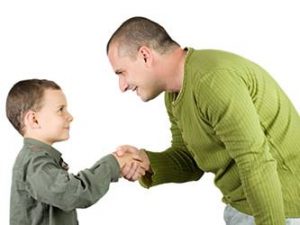 Many of you know that I am not a fan of the fist-pump or a high-five as a greeting. I still believe nothing is a more powerful welcome than a firm handshake. Imagine my dismay some years ago when I introduced my elementary school grandson to our new deacon. “Josh, shake hands with Deacon Smith,” I began. “And tell him you are glad to meet him.”
Many of you know that I am not a fan of the fist-pump or a high-five as a greeting. I still believe nothing is a more powerful welcome than a firm handshake. Imagine my dismay some years ago when I introduced my elementary school grandson to our new deacon. “Josh, shake hands with Deacon Smith,” I began. “And tell him you are glad to meet him.”
Joshua respectfully extended his hand. Deacon lifted his own hand above Josh’s head and said, “Give me a hi-five!” A lesson in adulthood foiled by a man of the cloth.
Phoebe Venable, a financial analyst, exonerated me today in her column, “7 childhood lessons for building adult success”. Her number 1 lesson: Master the handshake. Others include: Cultivate curiosity, Get a job, Know how to change a tire and four more.
This is a great piece, I can’t say it any better, so I am posting this as a guest blog.
Thank you, Phoebe Venable.
————————————
Every year, my firm hosts “Money Camp” for our clients’ children and grandchildren. We believe that even young children can, and should, learn the basics of spending, saving, investing and charitable giving. But there are other critical lessons that only a parent can teach their children. Lessons in confidence, self-reliance, perseverance, inquisitiveness, kindness and hard work. Lessons that not only forge character, but could have a direct correlation one day to your adult child’s personal and professional success.
- Master the handshake.
In the movie “My Life,” Michael Keaton’s character is dying of cancer and decides to film advice for his unborn child. One memorable scene is his demonstration of how to properly shake hands. It’s big, bold, funny — and spot-on. Our children, boys and girls, need the confidence to make and keep eye contact when they meet other people and to give a firm handshake. As social psychologist Amy Cuddy explains in one of the most popular TED Talks of all time, our body language can change not only other people’s perceptions of us but even our own brain’s testosterone and cortisol levels — which, too, can impact success.
- Get a job.
Nothing teaches the value of hard work quite like — you got it — hard work. Whether it’s a part-time job, a summer job and/or responsibilities at home, children will learn essential life lessons through work. That monetary reward requires labor and with that labor also comes other rewards — a well-deserved sense of accomplishment, for instance. Additionally: time and project management, goal setting, teamwork, punctuality and more.
- Hone communication skills.
We live in a world of powerful, omnipresent communication devices. Knowing how to use those is important. Knowing how to speak and write well are still indispensable to explaining, selling, inspiring and leading. Parents, make sure your children are learning to present their ideas and address groups in school. If your kid is selling candy or magazines to neighbors for a school fundraiser, or peddling their lawn-mowing services, help them concoct a polite, persuasive pitch. Make sure they can compose clear, cogent, complete sentences. Jargon, shorthand and emoticons don’t cut it in the business world. A sure-fire way to improve communication skills: read books.
- Cultivate curiosity.
Encourage children to ask questions. When they ask questions about the world, they’ll learn, often by being compelled to go find answers for themselves. Hopefully they’ll also learn to listen, care more and understand what motivates people. That’s becoming smarter and more human, and people like that go far in life.
- Know how to change a tire.
It’s not only a practically useful skill for the day your child has a flat, but it will help instill in your children self-sufficiency. To look for solutions when the unexpected arises. To feel equal to a challenge. To think and act under pressure. To understand that doing something yourself is often more effective, efficient and satisfactory than outsourcing it to others.
- Volunteer.
There’s more to life than work and play. There are great causes for improving the world, as well as other people, often less fortunate, that need our help. “No man is an island,” wrote the poet John Donne. We’re all a piece of a larger continent — be it a family, a neighborhood, a community, a nation or the world. Get your children involved through Scouting, church or organizations such as Hands On Nashville or Second Harvest Food Bank. Helping others will expand your child’s mind and heart.
- Acquire some financial grounding.
There is a financial component to nearly every endeavor, including any business, running a household and planning for retirement. Ensure your children understand the basics before they graduate high school: income, expenses, profits, interest, inflation, return, risk, liquidity and the time value of money, to name a few.
If you think these are great, let Phoebe know at Phoebe Venable, FOR USA TODAY NETWORK – TENNESSEE, Jan. 27, 2017
Phoebe Venable, chartered financial analyst, is president and COO of CapWealth Advisors, LLC. Her column on women, families and building wealth appears every other Saturday in The Tennessean.

Nice article
Gimme a high five

Thanks, Alan, I appreciate all you do for me and your great sense of humor.
Such good advice, Dr. Par. Being a Toastmaster, of course I loved the third one, “Hone Communication Skills.”
I’ll post this on my social media sites.
Thanks, they’re all great, just like all the work you do!